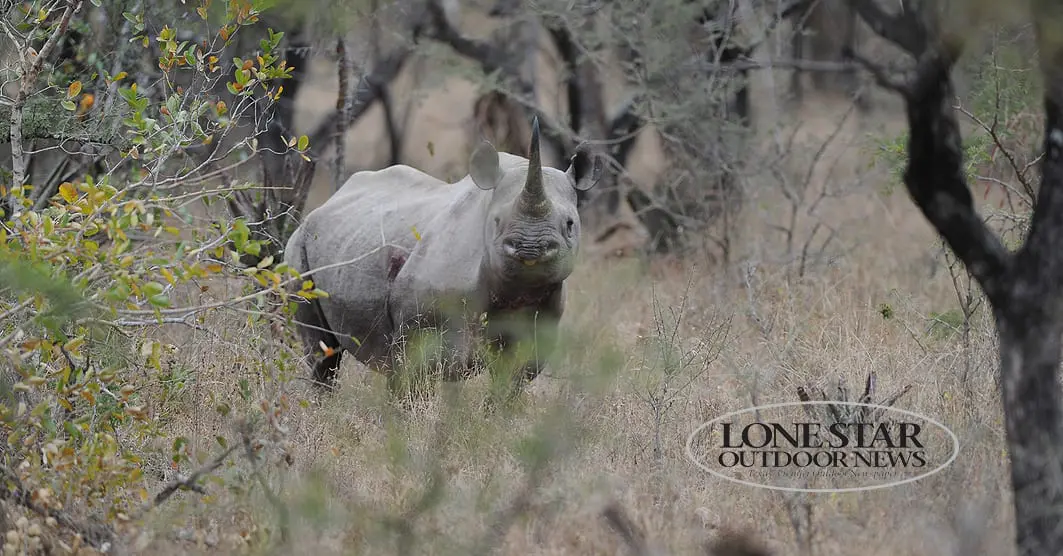Written by USFWS
Based on extensive assessments of the conservation and management programs of black rhinos in Namibia and elephants in Zimbabwe, the U.S. Fish and Wildlife Service has found that the import of two sport-hunted black rhinoceros trophies from Namibia will benefit conservation of the species, while the import of any elephant sport-hunted trophy from Zimbabwe will not. Under the Endangered Species Act, the Service authorizes imports for sport-hunted trophies of elephants and rhinos only when hunting in the country of origin is well-regulated, sustainable and benefits conservation of the species in question.
“United States citizens make up a disproportionately large share of foreign hunters who book trophy hunts in Africa,” said Service Director Dan Ashe. “That gives us a powerful tool to support countries that are managing wildlife populations in a sustainable manner and incentivize others to strengthen their conservation and management programs.”
The black rhino hunts associated with the imports of two sport-hunted trophies are consistent with the conservation strategy of Namibia, a country whose rhino population is steadily increasing, and will generate a combined total of $550,000 for wildlife conservation, anti-poaching efforts and community development programs in Namibia.
Namibia’s Black Rhinoceros Conservation Strategy concentrates on maximizing population growth rates through biological management and range expansion, with an overall goal of increasing Namibia’s black rhino population by at least five percent per year. Under this strategy, Namibia’s black rhino population more than doubled between 2001 and 2012. Local communities are an integral part of this strategy and receive direct benefits from the presence of black rhinos, thereby providing a disincentive to poaching.
Dallas Safari Club, the conservation organization that auctioned the hunt in early 2014, says the federal approval is vindication for biologists in Africa who prescribed the hunt as way to grow rhino populations. Aged, non-breeding male rhinos are known to charge and kill younger bulls, cows and even calves. This behavior, well documented in scientific literature, jeopardizes the future of a herd. Removing these animals enhances herd productivity.
DSC auctioned the permit for $350,000 – reportedly the highest price ever paid for a big-game hunting permit in Africa — with 100 percent of proceeds going to Namibia for rhino conservation, habitat and anti-poaching initiatives.
“Animal rights extremists bashed the scientists, threatened the buyer and harassed DSC. Now that the world’s leading conservation agency has approved the hunt as a way to help rhino populations, and issued an import permit, I hope some of the naysayers will make an effort to actually understand what they were protesting,” said Ben Carter, DSC executive director.
In North America, trophy game hunting has led to the restoration of the white-tailed deer, elk, moose and a number of other species. As the International Union for the Conservation of Nature and other international wildlife management and conservation organizations recognize, well-managed wildlife programs that include limited, sustainable sport hunting can and have provided significant long-term benefits to the populations of many species. By law, the Service cannot and will not allow trophies of certain protected species into the United States that were hunted in any nation whose conservation program fails to meet high standards for transparency, scientific management and effectiveness.
Annually, Namibia’s management plan for black rhinos allows the harvest of five males, a decision that has also been supported by the member countries of the Convention on International Trade in Endangered Species of Wild Fauna and Flora (CITES). Although these rhinos may still be physically capable of reproducing, they are presumed to be genetically well-represented in the population and their removal may provide the opportunity for younger, less dominant males to reproduce, leading to a possible population increase.
“The future of Africa’s wildlife is threatened by poaching and illegal wildlife trade, not responsible, scientifically managed sport hunting,” said Ashe. “We remain committed to combating heinous wildlife crimes while supporting activities that empower and encourage local communities to be a part of the solution.”
In contrast to Namibia’s exemplary management and conservation program for black rhinos, Zimbabwe’s elephant management plan primarily consists of two outdated documents that lack information on their implementation and the progress made toward meeting stated goals and objectives. Although Zimbabwe has recently made strides in gathering data on its elephant population, it still does not have adequate information to establish scientifically defensible hunting quotas. For 2015, Zimbabwe has set its own export quota for elephant sport-hunted trophies at 500 individuals, but it’s unclear how that number was decided and if biological factors were taken into account.
Due to the inadequacy of information on Zimbabwe’s elephant management program, as well as lingering questions about law enforcement and the use of hunting revenues, a suspension on the import of elephant trophies from Zimbabwe has been in place for trophies taken on or after April 4, 2014. Today the Service announced this suspension extends into 2015 and indefinitely into the future. The Service could reconsider this suspension if information is received that documents that the situation in Zimbabwe meets the criteria established under the ESA.
During a 30-day public comment period on the import of two black rhino trophies hunted in Namibia, the Service received more than 15,000 individual comments and more than 135,000 petition signatures. The Service reviewed each of those comments for scientific or technical information to inform its decision and carefully considered the concerns and perspectives of commenters.
For more information on the decision to authorize the import of two sport-hunted black rhinoceros trophies hunted in Namibia, please refer to: http://www.fws.gov/international/permits/black-rhino-import-permit.html.
For more information on the decision to continue the suspension on the import of sport-hunted elephant trophies hunted in Zimbabwe, please refer to: http://www.fws.gov/international/pdf/questions-and-answers-suspension-of-elephant-sport-hunted-trophies.pdf.


